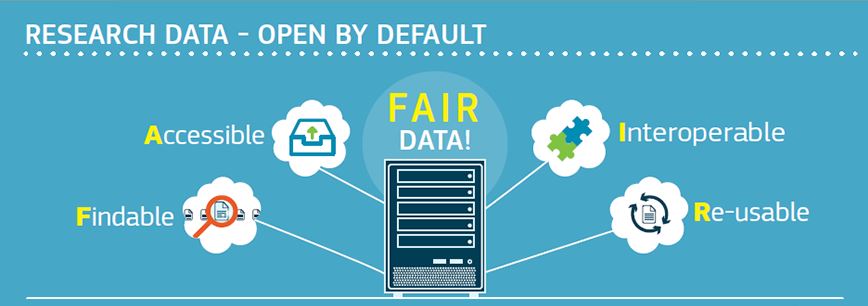Addressing the FAIR data principles when managing research data
26/02/2020

In the context of open science the goal of many research funders is that the research data from funded projects are deposited as open data in a digital repository, e.g. CORD
FAIR is an acronym to help you remember your key goals for managing your research data, and you should build this into your research plan from the start. Your data should be Findable, Accessible, Interoperable and Reusable.
To achieve FAIRness, datasets should be available online in a searchable resource, e.g., a catalogue, data repository or archive, and at least have:
- A persistent identifier (PID). An example of this is a digital object identifier (DOI), which is a permanent url that can always be used to link to the resource and will make the data more findable
- Rich metadata (elements which describe the data). This will enhance findability, interoperability and reusability of your data
- A clear licence. This lets researchers who find a dataset understand what they are allowed to do with it
Findable
- Your data will be published online in a searchable resource e.g. catalogue, data repository or archive.
- Your chosen repository or archive will assign a persistent identifier to your data.
- You will provide rich metadata describing your data, according to the requirements of the repository or archive.
Accessible
Not all data can be made openly available and FAIR does not mean that data need to be open. As a rule of thumb data should be ‘as open as possible, as closed as necessary’.
- If your data can’t be made openly available, access conditions should be made clear to researchers wishing to re-use your data, e.g. only available for research purposes.
- Metadata will be accessible, wherever possible, even if the data aren’t.
Interoperable
Data and metadata should conform to widely used file formats and disciplinary standards for data collection should be used where possible to allow your data to be combined and re-used with other data.
- Your data will be provided in suitable file formats for long term access and re-use.
- The metadata will be provided following relevant disciplinary standards.
- Controlled vocabularies, keywords, thesauri or ontologies will be used where possible.
Reusable
A lot of documentation is needed to support data interpretation and reuse. The data should conform to community norms and be clearly licensed so others know what kinds of reuse are permitted.
- Your data will have a clear and accessible data usage license.
- Your data and metadata will meet relevant disciplinary standards.
Useful resources
- Wilkinson, M. D. et al. The FAIR Guiding Principles for scientific data management and stewardship. Scientific Data 3:160018 doi: 10.1038/sdata.2016.18 (2016).
- FAIRsharing.org is a curated, informative and educational resource on data and metadata standards, inter-related to databases and data policies.
- Ball, A. (2014). ‘How to License Research Data’. DCC How-to Guides. Edinburgh: Digital Curation Centre. Available: http://www.dcc.ac.uk/resources/how-guides
Image from
https://www.openaire.eu/open-research-data-the-new-norm-in-h2020
Categories & Tags:
Leave a comment on this post:
You might also like…
Introducing…. BankFocus (Orbis)
For anyone researching the financial sector, BankFocus is a great place to start, providing financial and company data for finance institutions and companies from across the world. The service allows you to search for a ...
The Implications of US Tariffs on global supply chains
US President Donald Trump's new tariff policies announced on April 2, 2025 are expected to cause significant disruptions to the global supply chains, affecting multiple sectors and countries. A simple mathematical equation uses a country’s ...
Mastering the art of revising your writing
You’ve done the research and written your first draft. Now it’s time for one of the most crucial jobs as a writer - revising your writing to ensure your reader does not have to work ...
A ‘hands-on’ take on warehouse design as part of my Logistics and Supply Chain MSc
As part of my core module for my Logistics and Supply Chain Management MSc, I had the amazing opportunity to work on a warehouse design project a few weeks ago. The problem statement for ...
Thinking about your literature review?
As part of your PhD or Master’s thesis, you will probably have to write a literature review. A successful literature review will offer an analysis of the existing research in your field, demonstrating your understanding ...
A beginner’s guide to sourcing a company beta
Beta is the measurement of a company’s common stock price volatility relative to the market. If you’re trying to find a current beta for a company there are a number of places to look. These ...






